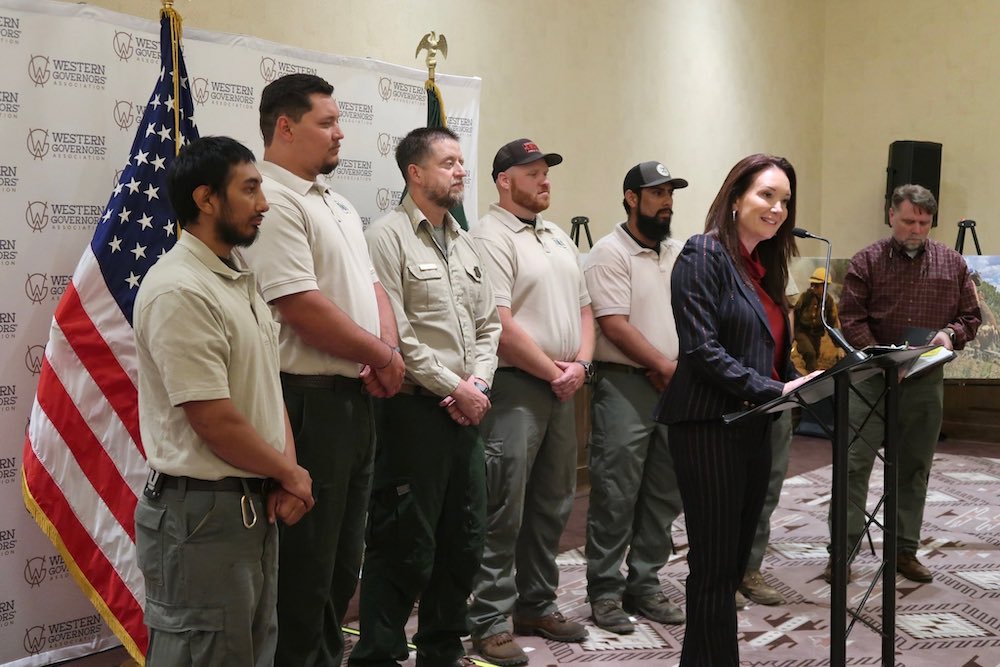
- Details
- By Chez Oxendine
- Energy | Environment
The Department of Agriculture announced its intent to rescind the Roadless Rule, which provides automatic environmental protections to federally owned lands without roads throughout the United States.
Agriculture Secretary Brooke L. Rollins made the announcement at a meeting of the Western Governors' Association in New Mexico on Monday. Rescinding the Roadless Rule will open nearly 59 million acres of national forest to road construction, development and timber harvesting, according to a USDA press release.
Road construction will help the U.S. Forest Service reach and manage potential wildfire hazards, Rollins said in the statement.
“This move opens a new era of consistency and sustainability for our nation's forests,” Rollins said. “It is abundantly clear that properly managing our forests preserves them from devastating fires and allows future generations of Americans to enjoy and reap the benefits of this great land.”
The announcement drew swift criticism from environmentalists, including legal advocacy group Earthjustice. Losing the wilderness protections provided by the rule would harm conservation efforts across the country, Earthjustice Vice President of Litigation Drew Caputo.
“The Roadless Rule is one of the most important land protection measures in American history,” Caputo told Tribal Business News. “It's protected nearly 60 million acres of wilderness, and now the Trump administration is proposing to throw it on the scrap heap, and that is extraordinary.”
President Bill Clinton instituted the Roadless Rule in 2001, during the last days of his administration. The rule has faced legal challenges since, including multiple injunctions, exemptions and revisions as federal leadership changed hands. President Donald Trump's first administration largely avoided the bulk of the rule and focused efforts primarily on opening portions of the Tongass National Forest in Alaska for timber harvesting and other development. The USDA under Trump issued a final rule in 2020 that allowed logging operations in much of the forest.
President Joe Biden later brought the forest back under Roadless Rule protections in 2021, per prior Tribal Business News reporting. On his first day in office, Trump reverted those protections, and now the USDA under his leadership plans to remove them entirely, a move that would leave 9 million of the Tongass' 17 million acres open to development.
Earthjustice estimates the resulting logging would increase by three times the acreage that would otherwise be impacted over the next 25 years under the existing forest plan, which was developed with multiple tribes and conservation groups.
Tribal leaders in the Tongass also opposed the announcement, saying that removing protections threatened fragile ecosystems still recovering from years of old-growth timber harvesting.
“The Roadless Rule has worked well for our tribe and our community by helping to protect customary and traditional uses of our lands and waters, and the fish, wildlife, trees and plants,” Mike Jones, president of the Organized Village of Kasaan, said in a statement. “This helps us honor our ancestors and provide for current and future generations. It would be a grave mistake to roll back these protections. The Roadless Rule must continue to be upheld across the Tongass National Forest.”
Joel Jackson, president of the Organized Village of Kake, said the Tongass was one of the last remaining temperate rainforests in American territory - a carbon sink that’s “important to everyone.”
“Our land is just now healing, food security is so important to us, the deer and moose are coming back to where we’ve been able to hunt on our own island. All the best wood has been cut down and exported,” Jackson wrote in an email to Tribal Business News. “We’re both forest and fish people, so this rescinding of the Roadless Rule is very important to us.”
The USDA's move aligns with a wider push across the Trump administration to open federal lands for development through various means. Earlier this year, the Department of Housing and Urban Development announced a partnership with the Department of the Interior to locate federal lands suitable for housing development.
A provision in the Senate version of the budget reconciliation bill currently working its way through Congress would allow the sale of more than 2 million acres of federal lands to private investors and developers, according to a story in The Hill.
Much of the Trump administration's policy and accompanying Republican priorities have centered on expanding access to domestic energy sources and addressing an ongoing housing crisis by providing more developable land. Caputo argues those policies will instead limit access to public lands and damage conservation efforts.
“The theme running through the Trump administration's management of federal land is to turn these lands over to private industries,” Caputo said. “These things all seem like part of a larger whole, which is to take lands that belong to all Americans and remove protections so that industry can do whatever it wants.”
Editor's Note: This story has been updated with a comment from the president of the Organized Village of Kake.
